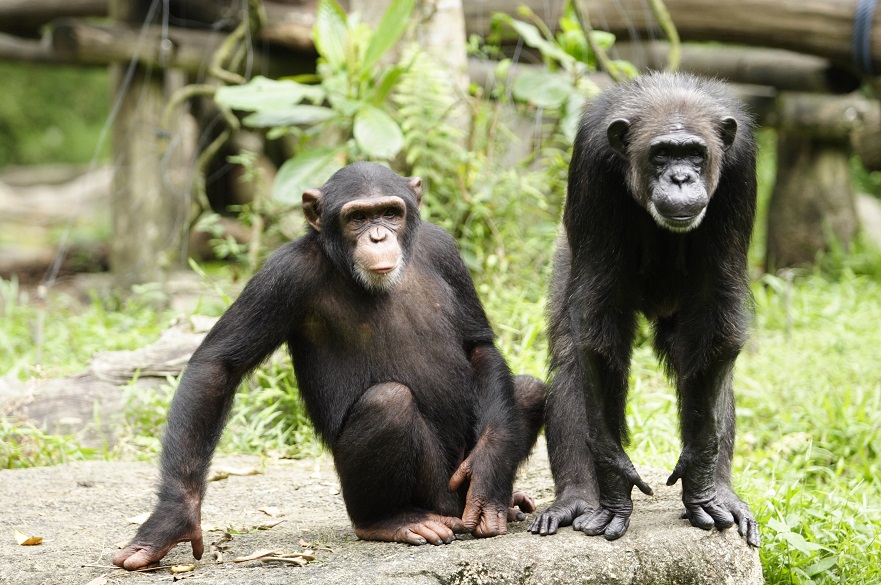Primate behaviour changed as zoos closed for pandemic, research suggests
Primates spent more time resting and alone, performed more sexual and dominance behaviours and ate less when zoos and safari parks were closed to the public during the first COVID-19 lockdown, a study suggests.
By Dave Rogers | Published on 5 September 2022
Categories: Press office; Research; School of Animal, Rural and Environmental Sciences;

Research involving experts in animal behaviour at Nottingham Trent University, Harper Adams University and the University of Wolverhampton investigated how the behaviour of bonobos, chimpanzees, western lowland gorillas and olive baboons changed as visitors began to return to zoos after prolonged and repeated periods of closure.
Human-animal interactions and the impacts of the presence of zoo visitors are considered crucial in relation to zoo animal welfare with studies showing that different species and even individual animals respond differently to different humans.
Research was undertaken in collaboration with researchers and keeping teams at two zoos. Bonobos, chimpanzees and gorillas were observed at Twycross Zoo while baboons were monitored by keeping staff at Knowsley Safari.
The researchers found that as visitors returned bonobos and gorillas spent less time alone and gorillas spent less time resting.
Chimpanzees ate more and engaged more with their enclosures when the zoo was open.
Olive baboons performed less sexual and dominance behaviour when visitors returned and approached visitor cars more frequently than they had the ranger’s vehicle when the park was closed.
The team argues that, while it can be difficult to accurately state whether experiences were positive, negative or neutral for individual animals, the return of visitors appeared to specifically stimulate the chimpanzees and baboons.
Similarly, bonobos and gorillas spending less solitary time could be seen as positive, although the reduction in resting behaviour in more sedentary gorillas could also suggest they were disrupted by visitors, the researchers say.
The team observed that gorillas altered the use of their enclosure which suggested they were able to modify their behaviour to reduce potential overstimulation and manage their own experiences effectively.
Baboons may have been stimulated by visitors and the presence of cars, the researchers say, but there was a threshold after which this did not increase. And the study reports that their increased sexual behaviour during closure may have been because they did not have the stimulation of the presence of moving vehicles.
“Primates are some of the most cognitively advanced species in zoos and their interactions with visitors are complex,” said Dr Samantha Ward, a zoo animal welfare scientist in Nottingham Trent University’s School of Animal, Rural and Environmental Sciences.
She said: “A limitation to understanding how visitors can affect behaviour of animals in zoos and parks is that they rarely close to the public for prolonged periods, so this provided us with a unique opportunity.
Dr Ellen Williams, a zoo animal welfare researcher at Harper Adams University, said: “Our study showed the varied ways in which visitors can influence the behaviour of primates in captivity. Behavioural changes and changes in enclosure use in the presence of visitors highlights the adaptability of zoo species to their environments. Provision of environments which enable animals to actively adapt in this manner is really important for their welfare.
“This collaborative study was really important in enabling us to understand the impacts of the closures on zoo animals. Future work could involve looking at the impact on a wider range of species in both zoos and safari parks as well as differences among individual animals.”
Behavioural data for the study was collected between April 2020 and September 2020 and November 2020 to January 2021 and spanned multiple open and closure periods.
Previous research by the team found that meerkats used to interacting with visitors in zoos responded positively but cautiously to the sudden return of people after the first COVID-19 lockdown ended.
The latest study is published in the journal Animals.
Notes for Editors
Press enquiries please contact Dave Rogers, Public Relations Manager, on telephone +44 (0)115 848 8782, or via email.
Nottingham Trent University (NTU) received the Queens Anniversary Prize for Higher and Further Education in 2021 for cultural heritage science research. It is the second time that NTU has been bestowed the honour of receiving a Queen’s Anniversary Prize for its research, the first being in 2015 for leading-edge research on the safety and security of global citizens.
The Research Excellence Framework (2021) classed 83% of NTU’s research activity as either world-leading or internationally excellent. 86% of NTU’s research impact was assessed to be either world-leading or internationally excellent.
NTU was awarded Outstanding Support for Students 2020 (Times Higher Education Awards). It was the University of the Year 2019 (Guardian University Awards, UK Social Mobility Awards), Modern University of the Year 2018 (Times and Sunday Times Good University Guide) and University of the Year 2017 (Times Higher Education Awards).
NTU is the 5th largest UK institution by student numbers, with over 33,000 students and more than 4,000 staff located across five campuses. It has an international student population of 4,000 and an NTU community representing around 160 countries.
In the past 15 years, NTU has invested £450 million in tools, technology and facilities.
NTU is in the UK’s top 10 for number of applications and ranked first for accepted offers (2019 UCAS UG acceptance data) It is also among the UK’s top five recruiters of students from disadvantaged backgrounds.
75% of NTU students go on to graduate-level employment or graduate-entry education / training within fifteen months of graduating (Guardian University Guide 2021).
NTU is 4th globally (and 3rd in the UK) for sustainability in the 2021 UI Green Metric University World Rankings (out of more than 900 participating universities).